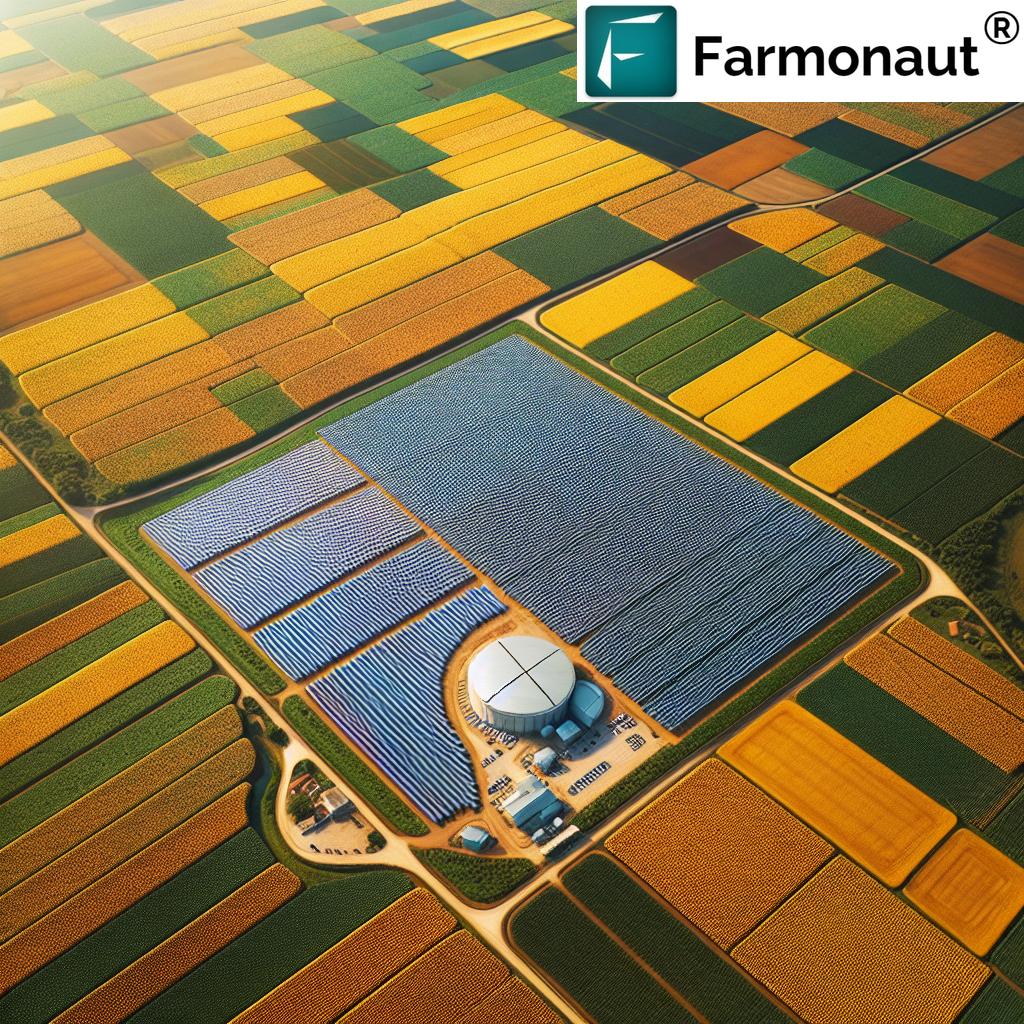Revolutionizing AgTech: How Missouri’s Global Network is Shaping the Future of Sustainable Farming
“Missouri’s global agricultural innovation network aims to connect over 100 agtech startups with industry leaders worldwide.”
In the heart of America’s heartland, a revolutionary initiative is taking root that promises to reshape the landscape of agricultural technology (AgTech) and sustainable farming practices worldwide. As we delve into this groundbreaking development, we at Farmonaut are excited to explore how this new global network is set to transform the AgTech industry and what it means for the future of agriculture.
The Dawn of a New Era in AgTech
The launch of Missouri’s global agricultural innovation network marks a significant milestone in the evolution of AgTech. This initiative is poised to revolutionize agricultural technology innovation and venture capital in agriculture, addressing the pressing need for sustainable farming solutions and precision agriculture technologies. By connecting agtech startup financing with industry leaders worldwide, this network is creating a robust ecosystem that promises to accelerate growth and innovation in the sector.

As we navigate this exciting new landscape, it’s crucial to understand the key components that make this network a game-changer for the industry:
- Global Connectivity: By fostering strategic relationships across borders, the network is creating a truly international platform for AgTech innovation.
- Capital Formation: The initiative is set to streamline and accelerate the process of securing venture capital for promising AgTech startups.
- Knowledge Exchange: Regular meetings and showcases will facilitate the sharing of emerging technologies and industry trends among members.
- Research Commercialization: The network aims to bridge the gap between agricultural research and practical, market-ready solutions.
The Impact on AgTech Investment Opportunities
The establishment of this global network is set to significantly expand agtech investment opportunities. By creating a centralized hub for innovation and investment, the initiative is making it easier for venture capitalists to identify and support promising AgTech startups. This influx of capital and strategic support is expected to fuel rapid advancements in agricultural technology innovation, leading to more efficient and sustainable farming practices worldwide.
“The new agtech initiative is expected to accelerate growth in the $7.8 trillion global agriculture industry by 15% annually.”
Let’s take a closer look at the global AgTech investment trends to understand the potential impact of this new network:
| Year | Region | Investment Amount (Billion USD) | Top AgTech Sectors | Year-over-Year Growth (%) | Notable Startups/Companies |
|---|---|---|---|---|---|
| 2020 | North America | 3.2 | Precision Agriculture, Vertical Farming | 12% | Indigo Ag, Plenty |
| 2021 | Europe | 4.5 | AI in Agriculture, Robotics | 18% | Ynsect, Infarm |
| 2022 | Asia | 5.8 | Biotechnology, Smart Irrigation | 22% | Ninjacart, Pinduoduo |
| 2023 | Global | 7.2 | Carbon Farming, Alternative Proteins | 25% | Apeel Sciences, Beyond Meat |
This data clearly illustrates the growing momentum in AgTech investments globally, with significant year-over-year growth across various regions and sectors. The new Missouri-based network is poised to capitalize on this trend, potentially accelerating investment growth even further.
Sustainable Farming Solutions: A Core Focus
At the heart of this initiative lies a commitment to developing and implementing sustainable farming solutions. As the global population continues to grow and climate change poses increasing challenges to traditional agriculture, the need for innovative, eco-friendly farming practices has never been more urgent.
The network aims to foster the development of technologies that address key sustainability challenges, including:
- Water conservation and smart irrigation systems
- Soil health management and regenerative agriculture practices
- Reduction of chemical inputs through precision agriculture
- Carbon sequestration and emissions reduction in farming
- Sustainable pest and disease management solutions
By focusing on these areas, the network is not only driving innovation but also contributing to global efforts to create a more sustainable and resilient food system.
The Role of Precision Agriculture Technologies
Precision agriculture technologies are set to play a pivotal role in the network’s efforts to revolutionize farming practices. These technologies leverage data, sensors, and advanced analytics to optimize every aspect of agricultural production, from planting to harvesting.
Key precision agriculture technologies being developed and promoted through the network include:
- Satellite and drone-based imaging: For real-time crop monitoring and health assessment
- IoT sensors: To collect data on soil conditions, weather, and crop growth
- AI and machine learning algorithms: For predictive analytics and decision support
- Automated farming equipment: Including self-driving tractors and precision sprayers
- Blockchain technology: For improving supply chain transparency and traceability
These technologies are not only improving farm productivity but also contributing to more sustainable practices by optimizing resource use and reducing waste.
Connecting AgTech Startup Financing with Global Leaders
One of the most significant aspects of this new network is its ability to bridge the gap between innovative AgTech startups and established industry leaders. This connection is crucial for several reasons:
- It provides startups with access to essential resources, including funding, mentorship, and industry expertise.
- It allows established companies to stay at the forefront of innovation by partnering with or acquiring promising startups.
- It accelerates the commercialization of new technologies, bringing them to market faster.
- It creates opportunities for cross-pollination of ideas and collaborative problem-solving.
By facilitating these connections, the network is creating a dynamic ecosystem that is greater than the sum of its parts, driving innovation and growth across the entire AgTech sector.

The Power of Regular Meetings and Showcases
A key feature of the new global agricultural innovation network is its commitment to hosting regular meetings and showcases. These events serve multiple purposes:
- Technology Showcases: Providing a platform for startups to demonstrate their latest innovations
- Trend Analysis: Discussing emerging industry trends and their potential impact
- Networking Opportunities: Facilitating connections between entrepreneurs, investors, and industry leaders
- Knowledge Sharing: Encouraging the exchange of ideas and best practices
- Collaborative Problem-Solving: Addressing industry challenges through collective brainstorming
These gatherings are essential for maintaining the network’s dynamism and ensuring that all members stay informed about the latest developments in the rapidly evolving AgTech landscape.
Accelerating Agricultural Research Commercialization
One of the most significant challenges in the AgTech sector has been the gap between academic research and practical, market-ready solutions. The new network aims to address this issue by accelerating the commercialization of agricultural research. This involves several key strategies:
- Partnerships with Universities: Collaborating with leading agricultural research institutions to identify promising technologies
- Technology Transfer Support: Providing resources and expertise to help researchers navigate the commercialization process
- Proof-of-Concept Funding: Offering financial support to help promising research projects reach the prototype stage
- Industry-Academia Matchmaking: Connecting researchers with industry partners who can help bring their innovations to market
- Intellectual Property Protection: Assisting in securing patents and other forms of IP protection for new technologies
By focusing on these areas, the network is helping to ensure that groundbreaking agricultural research doesn’t remain confined to academic journals but instead finds its way into the hands of farmers and agribusinesses where it can make a real-world impact.
The Role of Farmonaut in the Evolving AgTech Landscape
As we discuss these exciting developments in the AgTech sector, it’s important to highlight how Farmonaut is contributing to this revolution. Our platform offers cutting-edge remote sensing and GIS solutions that align perfectly with the goals of precision agriculture and sustainable farming.
Farmonaut’s key offerings include:
- Satellite-Based Crop Health Monitoring: Providing real-time insights into vegetation health and soil moisture levels
- AI-Driven Advisory Systems: Offering personalized recommendations for crop management
- Blockchain-Based Traceability: Ensuring transparency and security in agricultural supply chains
- Resource Management Tools: Helping farmers optimize their use of water, fertilizers, and other inputs
These technologies are helping farmers around the world to improve their productivity, reduce their environmental impact, and adapt to changing climate conditions.
For more information on our services, visit our web app or check out our mobile apps:
The Future of AgTech: Trends and Predictions
As we look to the future, several key trends are likely to shape the AgTech landscape:
- Increased AI and Machine Learning Integration: These technologies will become even more sophisticated, offering more accurate predictions and personalized recommendations.
- Expansion of Vertical Farming: Urban agriculture solutions will continue to grow, addressing food security concerns in cities.
- Advancements in Gene Editing: CRISPR and other gene-editing technologies will play a larger role in crop improvement and pest resistance.
- Growth of Regenerative Agriculture: Practices that focus on soil health and carbon sequestration will gain more traction.
- Increased Focus on Alternative Proteins: Plant-based and lab-grown meat alternatives will continue to attract investment and innovation.
The new global agricultural innovation network is well-positioned to support and accelerate these trends, driving the AgTech industry forward into a more sustainable and productive future.
The Global Impact of Missouri’s AgTech Initiative
While centered in Missouri, the impact of this new network is set to be felt globally. Here’s how different regions around the world stand to benefit:
- North America: Strengthening the U.S.’s position as a leader in AgTech innovation and sustainable farming practices.
- Europe: Facilitating knowledge exchange and collaboration with European AgTech hubs, particularly in areas like precision farming and sustainable agriculture.
- Asia: Providing access to cutting-edge technologies that can help address food security challenges in rapidly growing populations.
- Africa: Offering opportunities for leapfrogging traditional agricultural methods and adopting advanced, sustainable farming practices.
- South America: Supporting the region’s large-scale agriculture industry with innovations in crop management and sustainability.
By fostering global connections and facilitating the exchange of ideas and technologies, the network is helping to create a more resilient and sustainable global food system.
Challenges and Opportunities Ahead
While the future of AgTech looks bright, there are still challenges to overcome:
- Technology Adoption: Ensuring that new technologies are accessible and user-friendly for farmers of all scales.
- Data Privacy and Security: Addressing concerns about the collection and use of farm data.
- Regulatory Hurdles: Navigating the complex regulatory landscape for new agricultural technologies.
- Climate Change Adaptation: Developing solutions that can help farmers adapt to changing climate conditions.
- Equity and Inclusion: Ensuring that the benefits of AgTech innovations reach small-scale and marginalized farmers.
However, these challenges also present opportunities for innovation and collaboration. The global network is well-positioned to address these issues by bringing together diverse perspectives and expertise.
Conclusion: A New Chapter in Agricultural Innovation
The launch of Missouri’s global agricultural innovation network marks the beginning of an exciting new chapter in the world of AgTech. By connecting startups, investors, researchers, and industry leaders from around the world, this initiative is creating a powerful ecosystem for innovation and growth in sustainable agriculture.
As we at Farmonaut continue to develop our remote sensing and GIS solutions, we’re excited to be part of this global movement towards more efficient, sustainable, and technologically advanced farming practices. The future of agriculture is being shaped today, and initiatives like this global network are helping to ensure that it’s a future that’s both productive and sustainable.
For those looking to stay at the forefront of these developments, we encourage you to explore our solutions and join us in revolutionizing agriculture for the 21st century.
Explore our API services:
Ready to experience the future of farming? Try Farmonaut today:
Frequently Asked Questions
- What is the main goal of Missouri’s global agricultural innovation network?
The main goal is to connect AgTech startups with industry leaders worldwide, fostering innovation and accelerating growth in sustainable farming solutions. - How does this network benefit AgTech startups?
It provides startups with access to funding, mentorship, and industry expertise, while also facilitating connections with potential partners and customers. - What role does precision agriculture play in this initiative?
Precision agriculture is a key focus, with the network promoting technologies that optimize resource use and improve farm productivity. - How does this network contribute to sustainable farming?
By fostering innovations in areas like water conservation, soil health management, and carbon sequestration, the network is driving the development of more sustainable farming practices. - Can international companies and investors participate in this network?
Yes, the network is global in nature and welcomes participation from international companies, investors, and researchers.




















